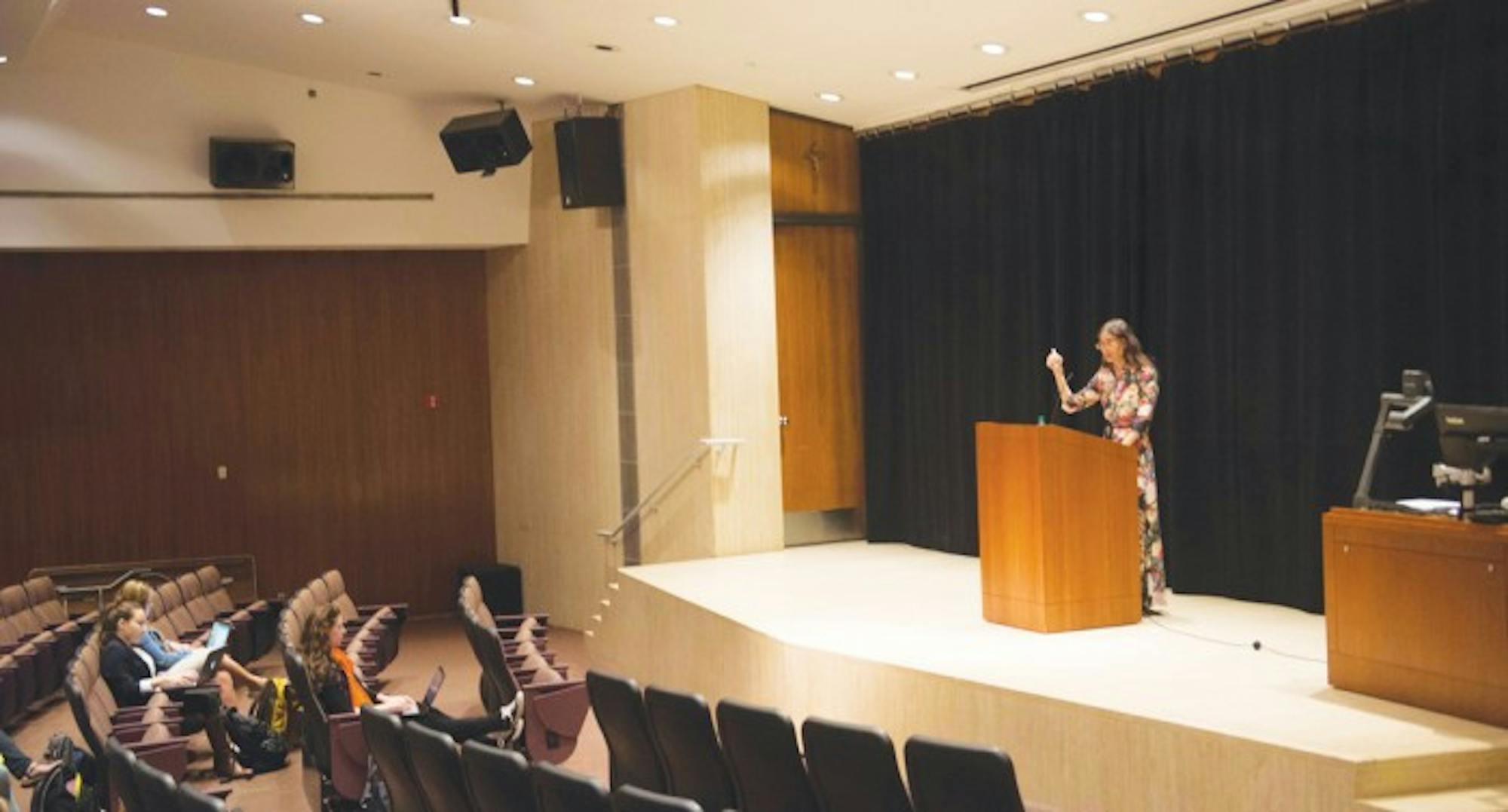Addressing campus sexual assault involves addressing the “ambivalence” to others inherent in hookup culture, author and researcher Donna Freitas told those gathered in Hesburgh Library’s Carey Auditorium on Tuesday night — and Catholic universities have the potential to be leaders in doing just that.

Freitas spoke in “SEXuality and Faith,” a lecture series sponsored by Campus Ministry and the Gender Relations Center. She studies collegiate culture as it relates to sexuality and religion and is the author of “Sex and the Soul: Juggling Sexuality, Spirituality, Romance and Religion on America’s College Campuses” and “The Happiness Effect: How Social Media is Driving a Generation to Appear Perfect at Any Cost.”
Freitas said in 2006, as she was beginning to study students’ attitudes towards sexuality, she spoke with “Amy,” a student who described a sexual encounter at a party — an encounter Freitas clearly saw as a sexual assault, though the student did not.
“It’s heartbreaking to listen to a smart, vibrant young woman talk about her many accomplishments and joys of college and then recount the time she was sexually assaulted as if it was just another day,” Freitas said. “It is even more disturbing when she doesn’t even identify it as assault but as simply the kind of thing that happens after you drink a lot at a party.”
Over the course of many conversations with students on other campuses, Freitas said she became convinced that Amy’s failure to recognize her own sexual assault as an assault was because her situation had been normalized. It was rooted in “hookup culture,” in which students seek brief sexual encounters characterized by not having feelings for their partners.
“It hadn’t occurred to anyone that in their disregard for one another in situations of sexual intimacy and their attempts to show how little they care about their partners, they might also create circumstances in which consent goes by the wayside, that in ignoring their partner’s feelings they might not notice when their partner says no or stops actively participating in the encounter, that in other words, they might not notice the moment in which a carefree hookup turns into a sexual assault or when consent becomes very very difficult to determine,” Freitas said.
Since that 2006 conversation, Freitas said, discussion of sexual assault, what it is and how to prevent it have become much more prevalent in the wake of student activism, scandals at universities, the high-profile documentary “The Hunting Ground” and a Department of Education directive to universities to address sexual assault under Title IX. Many universities created initiatives to teach students about the importance of consent to sexual activity.
But classes, guerrilla ads and lectures are useless if universities do not address the “ambivalence” of hookup culture, Freitas said.
“It renders our education around it ineffective if we fail to address the dominant framework about sex and one’s partners that we all inherit,” she said. “We also fail to address that we are offering the generations coming up a paradox when we teach them about consent because consent is anything but ambivalent.”
Catholic universities, Freitas argued, are uniquely able to create a “culture of consent” because ideas and vocabulary related to social justice, such as community, solidarity and dignity, are at the forefront of campus discourse.
“When I ask social-justice-fueled questions at lectures at Catholic campuses across the U.S., a kind of peer pressure ripples across the room for people to care or at least to appear to care about subjects like human dignity and the responsibility to attend to the suffering of others,” she said. “I can’t think of a single student over the course of a decade of speaking who shrugs at an idea like human dignity. Isn’t that the absolute best kind of peer pressure?”
Freitas said tenets of social justice are not, however, always directed to a campus’ own culture. Further, she added Catholic colleges face a fundamental fear of addressing sexual assault because extramarital sex itself is perceived as outside of Catholic tradition.
“A prevailing sense exists, on an institutional level, that we are doing something we shouldn’t when we program around sex, that we are somehow going against the Catholic tradition to deliver essential information to the people who need it,” Freitas said. “To talk about sex at all is often understood as a transgressive act. We fear that, by addressing it, we admit that people are having sex which publicly diminishes the Catholic reputation and identity of the college.”
As a result, Freitas said, Catholicism is perceived as unhelpfully rigid when it comes to sex.
Instead, she said, Catholic universities should tap into the welcoming nature of Catholic social tradition, using Pope Francis’ promotion of mercy as well as the idea of “creative attention” — recognizing another’s existence by acknowledging his or her struggles and vulnerability — to understand consent as respect for others.
“We must admit to ourselves that social justice teaching cannot and do not stop once the kegs start flowing on a Friday, that they extend to the wee hours of the morning, to the drunkenness, to the partners with whom we want to have sex,” she said. “To teach consent is social justice work, period. It is to practice this part of our tradition in the most urgent and hidden part of our campuses. It is to ensure that members of a Catholic community learn about respect for the dignity, bodily and emotional well-being of our partners, their autonomy, their agency, the right to agree or disagree when engaging in sexual intimacy.”













